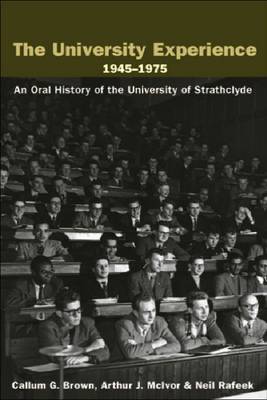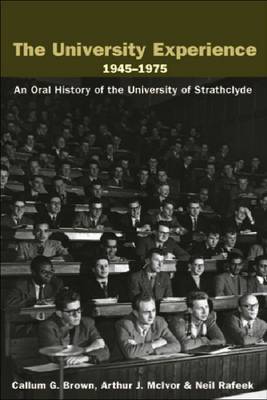
- Retrait gratuit dans votre magasin Club
- 7.000.000 titres dans notre catalogue
- Payer en toute sécurité
- Toujours un magasin près de chez vous
- Retrait gratuit dans votre magasin Club
- 7.000.0000 titres dans notre catalogue
- Payer en toute sécurité
- Toujours un magasin près de chez vous
The University Experience 1945-1975
An Oral History of the University of Strathclyde
Callum G Brown, Arthur J McIvor, Neil Rafeek
Livre broché | Anglais
47,45 €
+ 94 points
Description
This is the first book devoted to an oral history of a British university during the 'swinging sixties'. Students, lecturers and support staff are interviewed about teaching and working on campus in the mid-twentieth century. Told in their own words, it is a story of struggle and sacrifice, pride and commitment. It reveals how the modern university transformed lives, how new technologies propelled path-breaking research, and how with new skills its graduates could remodel society. The University of Strathclyde was created in central Glasgow in 1964 from the merger of two higher-education colleges. The Andersonian started in 1796 as Britain's first college to offer technical-based higher education to both women and artisans, whilst the Commercial College's opening literary night in 1847 was chaired by Charles Dickens. By the 1950s, both colleges still offered students 'useful knowledge' in engineering and commercial subjects, and launched them into local employment according to family traditions. But then in the mid-1960s, industrial decline struck Glasgow. Against the backdrop of the city's tough reputation and devastating social problems, lecturers and students with a mission to improve society came to a new University that offered opportunity - especially to women, mature students, the working classes and minority groups. Eschewing institutional history, this book debunks the myth of the drop-out generation of sixties' students, their drugs and underground culture. It shows how one University developed as a community of the dedicated and brilliant, creating the learning and researching environment which made 'Going to the Unie' the classic formative experience of the British people in the late twentieth century.
Spécifications
Parties prenantes
- Auteur(s) :
- Editeur:
Contenu
- Nombre de pages :
- 288
- Langue:
- Anglais
Caractéristiques
- EAN:
- 9780748619320
- Date de parution :
- 19-07-04
- Format:
- Livre broché
- Format numérique:
- Trade paperback (VS)
- Dimensions :
- 155 mm x 231 mm
- Poids :
- 748 g

Les avis
Nous publions uniquement les avis qui respectent les conditions requises. Consultez nos conditions pour les avis.






